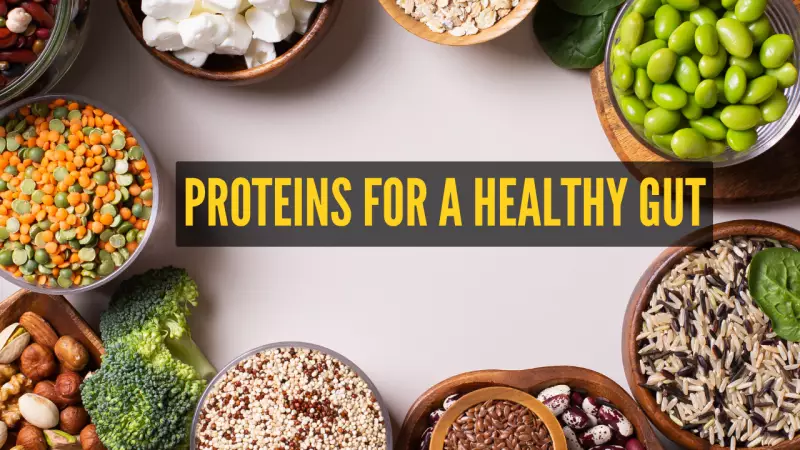
In the pursuit of overall wellness, the significance of a healthy gut is paramount. Coupled with this, a substantial intake of protein is essential, as it serves as the fundamental building block of the human body. Protein is vital for constructing, mending, and maintaining tissues like muscles, skin, and organs. It also fuels the production of enzymes, hormones, and antibodies, which are crucial for a robust immune system and overall bodily functions. Furthermore, protein enhances physical strength, aids in weight management by promoting satiety, and supports healthy aging by preventing muscle deterioration. Therefore, integrating rich protein sources into your daily diet is imperative.
According to guidelines from the British Heart Foundation, most adults require approximately 0.75 grams of protein per kilogram of body weight daily. This translates to about 45 grams for the average woman and 55 grams for men. Dr. Pal Manickam, a renowned gastroenterologist and preventive health expert based in the USA, recently highlighted this on Instagram. He shared an informative reel detailing the top five vegetarian protein-rich foods that are also exceptionally friendly to your gut microbiome.
Top 5 Vegetarian Protein Powerhouses for Your Gut
Dr. Pal's list focuses on foods that deliver a powerful protein punch while being gentle and beneficial for digestive health. His selections are ideal for anyone looking to enhance their diet with nutritious, plant-based options.
1. Tempeh: The Fermented Favorite
Topping Dr. Pal's list is tempeh, a fermented soy product that is a stellar source of vegetarian protein. It provides an impressive 19 grams of protein per 100-gram serving. Its firm texture and nutty flavor make it a versatile ingredient in various dishes.
You can marinate tempeh in light soy sauce, ginger, and garlic, then grill or stir-fry it for a delicious high-protein snack or salad topper. It also works wonderfully when added to Thai curries, nourishing rice bowls, or whole-wheat wraps, where it provides a satisfying, meaty texture.
2. Low-Fat Paneer: The Indian Classic
A staple in Indian kitchens, low-fat paneer is another excellent choice, offering about 18 grams of protein per 100 grams. It's a fantastic way to meet your protein needs without excessive fat.
For a protein-packed start to your day, add cubes of low-fat paneer to your scrambled eggs, oatmeal, or morning vegetable bowls. At lunch or dinner, toss it into stir-fries, fresh salads, or light curries prepared with minimal oil. When you need a quick snack, simply grill or air-fry seasoned paneer cubes for a wholesome and tasty bite.
3. Greek Yogurt: The Creamy Powerhouse
This thick and creamy dairy product is not only delicious but also a great source of protein, providing 10 grams per 100-gram serving. It is also packed with probiotics, which are beneficial for gut health.
Enjoy Greek yogurt for breakfast by pairing it with fresh fruits, seeds, and a drizzle of honey. It also serves as a perfect base for creamy smoothies or healthy, homemade dips, making it easy to incorporate into your daily routine.
4. Tofu: The Versatile Wonder
Tofu, a soy-based product, is a versatile and popular protein source for vegetarians. Dr. Pal notes that it contains approximately 8 grams of protein per 100 grams.
Incorporate tofu into your meals by adding it to soups, rice bowls, or stir-fries with soy sauce and vegetables. For breakfast, you can blend it into smoothies for a protein boost or scramble it with turmeric and veggies as a substitute for eggs. Crumbled or grilled tofu also makes a fantastic topping for salads with greens and light dressings.
5. Sprouted Moong Dal: The Fiber-Rich Legume
Completing the list is sprouted moong dal (green gram). The process of sprouting enhances its nutritional profile, boosting both protein and fiber content. It provides about 7 grams of protein per 100 grams.
For a refreshing and crunchy salad, mix sprouted moong with cucumber, tomatoes, a squeeze of lemon juice, and a pinch of chaat masala. You can also lightly steam or sauté it with curry leaves and mustard seeds for a warm, comforting, and nutritious snack.
A Crucial Note on Protein and Gut Health
In his post, Dr. Pal emphasized a key insight from gut research. While non-vegetarian foods are often high in protein, they are not inherently gut-friendly unless consumed alongside adequate dietary fiber. The vegetarian options listed above naturally combine protein with fiber and other nutrients, making them superior choices for maintaining a healthy and balanced digestive system.
Disclaimer: The information provided in this article is intended for general informational purposes only and should not be considered medical advice. It is always recommended to consult with your healthcare practitioner or a registered dietitian before making significant changes to your diet or starting any new health routine.





